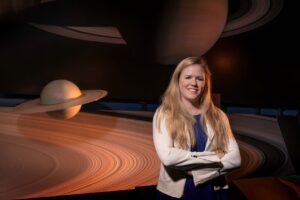
50/60/70 Year Members
Featuring a Talk by
Dr. Laurie Barge, Jet Propulsion Laboratory
“Searching for Signs of Life and its Origin on
Other Planets”
Wednesday, May 12, 2021
7:00 – 9:00 pm
To make a reservation to attend the virtual presentation, please sign up at:
http://bit.ly/2021-50-year-celebration
You will receive a confirmation email with the zoom meeting link.
Abstract: Is there life elsewhere in the solar system, and if so how can we find it? Astrobiologists work to define what life is and to figure out how to recognize it on another world, and to understand the processes that could get life started in the first place. This effort involves not only exploring other planets with spacecraft, but also understanding Earth’s history and how life has evolved on our planet to yield an amazing diversity and resilience. Meanwhile, it is important to study abiotic chemical processes in the lab, since prebiotic chemistry can become more complex when devoid of biological influence, and may be a current or formerly active process on other worlds such as Enceladus, Ceres, or Mars. In this talk I will discuss how astrobiologists approach the search for life on other planets, and describe some of the difficulties in distinguishing living and non-living systems. I will also share some of my lab’s work on simulating energy and prebiotic chemistry in deep sea hydrothermal vents, and how we prepare for characterizing such systems if they were to be encountered on other worlds.
Biography: Dr. Laurie Barge is a Research Scientist in Astrobiology at the NASA Jet Propulsion Laboratory. She co-leads the JPL Origins and Habitability Laboratory which studies how life can emerge and be detected in planetary environments, and she is the Investigation Scientist for the HiRISE instrument on NASA’s Mars Reconnaissance Orbiter (MRO) mission. Dr. Barge is interested in how complex organic chemistry and life can emerge on planets. She is also interested in hydrothermal vents as planetary analogs, and is the science lead for an underwater laser divebot that will be deployed to a seafloor vent in the Pacific in 2021.
Dr. Barge received her Bachelor’s degree in Astronomy and Astrophysics from Villanova University, and her Ph.D. in Geological Sciences from the University of Southern California. After graduate school she was a Caltech postdoc and then a NASA Astrobiology Institute postdoctoral fellow. For her astrobiology research Barge has received the JPL Lew Allen Award, the NASA Early Career Public Achievement Medal, and the Presidential Early Career Award for Scientists and Engineers.
Prior to Dr. Barge’s talk, we will honor our 50, 60 and 70 year members. We would like to congratulate our senior members on their tenure and thank them for their long-term support of the American Chemical Society:
Bruce S. Brunschwig
Robert H. Frisbee
Christine E. Geosling
David G. Kaplan
Richard W. Kidd
James J. Margitan
Mostafa A. H. Talukder
60 Year Members
Kyle D. Baves
Karl O. Christe
Thomas W. Giants
Margaret Holzer
Bruce E. Kaplan
T. Joseph Lin
Sofia Pappatheodorou
Leo Roos
Stuart Salot
Kenneth L. Servis
70 Year Members
Phillip G. Abend
Barbara T. Coleberd
Lloyd E. Gardner
We want to remind our older members that we have a spot on our website for reminiscences by our Senior Members. If you have an anecdote, story or remembrance of your career as a chemist that you would like to share, please send it to Nancy Paradiso in the Section Office at office@scalacs.org.
